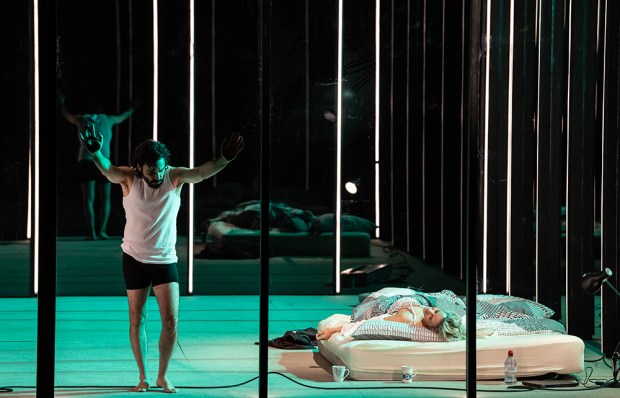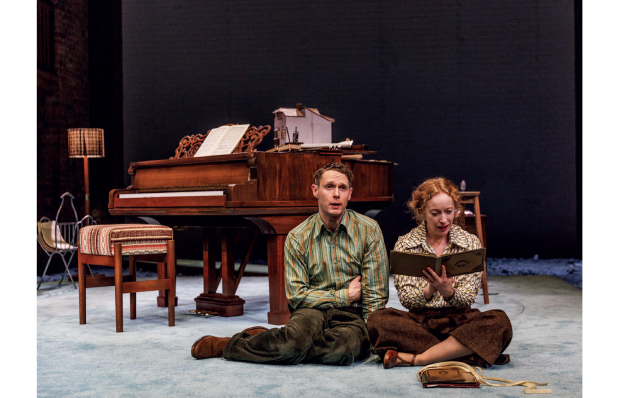Simon Stephens gives his plays misleading titles. Nuclear War, Pornography and Punk Rock contained little trace of their advertised ingredients. Heisenberg: The Uncertainty Principle includes no information about the German physicist or his theories. This is a sentimental romcom starring Anne-Marie Duff as a giggling airhead who stalks a grunting Cockney shopkeeper played by Kenneth Cranham. He’s 75 years old and though she’s in her mid-forties she has the skittish desperation of a gold-digging pensioner trying to act the nubile bimbo. Both characters are bored loners adrift in London. And because they’re solidly working class (she’s a receptionist, he’s a butcher), they excite our curiosity as lesser beings far removed from our own social milieu. This is important for the writer and the audience. Had the play been about a female QC seducing a linguistics professor, the affair would have seemed unconvincing, and the emotional mood would have been far harder to capture through dialogue.
As it is, the couple are comfortingly stupid. We learn this early on when they express surprise that the word ‘cyclical’ has entered their discourse. Their personalities are not convincingly sketched out and they reveal themselves by spouting random ‘opinions’ that might have been generated by a computer. She tells him that she likes porridge and copulating with sex-starved geriatrics. He reciprocates with the news that he enjoys the word ‘deluded’ and relishes place names that rhyme. ‘I’m tremendously enthusiastic about chocolate,’ he adds. This navel-gazing wittering makes up much of their talk and the play develops into a series of fraught dates between two dim chatterboxes whose dialogue would barely make an episode of The Archers.
Then they have sex. The atrocity takes place on a springy mattress in full view of the auditorium with both playmates peeling down to their undies. It’s stare-at-your-shoes bad. Imagine Kim Cattrall being bear-hugged by Gary Glitter, or Amber Rudd fighting off an unbuttoning Santa Claus. To her credit, Anne-Marie Duff has toned up nicely for the trampoline exercises but gym-dodger Cranham is packing the best part of a camel hump beneath his Charles Hawtrey vest. After their creaky gymnastics, the lovers fall apart, reunite, and then cross the Atlantic to search for Duff’s long-lost son whose address has been traced to an American city. (Don’t tell them about the internet, by the way, in case the play comes to a halt.) The final scenes are touching in a rather mawkish fashion but the bulk of the show is a dreary and faintly incredible soap opera.
Commercially, however, this is a brilliant piece of packaging. The smart designs by Bunny Christie are an enjoyable distraction from the rhubarb-rhubarb dialogue. And the show knows exactly how to please its target audience: the elderly. What a treat for bus pass-holders to watch a voyeuristic fantasy in which two wizened numpties enjoy an 11th-hour knee-trembler on a rubber-sheeted Slumberland. Some may object that the play’s title is dishonest. In any marketplace outside of the arts, a change of label would be imposed by trading standards officers. It’s not too late for a more truthful version: Last Bunk-up In Clerkenwell or Deathbed Grope for Pre-Grave Crocks.
The National has a farcical new version of the St George myth directed by hit-maker Lyndsey Turner. Rory Mullarkey’s script moves at the speed of sludge. George enters as a crass bumpkin in the Middle Ages. He challenges a nasty dragon, acquires some armour and duly kills it. These small events take an hour to grind through. George moves to stinky, smoky Victorian London where the dragon has morphed into a top-hatted banker. Finally, in the present day, the dragon reappears as a desk-sergeant. The message is rather puzzling. Are cops and capitalists the worst threats faced by England’s Christian martyr? Or has a different foe been overlooked here? Maybe you can guess what it is. The show’s tone of Pythonesque zaniness may amuse for a few minutes but it can’t be sustained for more than two hours.
Turner, such a gifted conjuror of atmosphere and emotion, has taken a punt on a script that doesn’t play to her strengths. Nor does it establish her as a comic talent. The result is a dud experiment lavishly executed with costly special effects and a flash-mob of 28 performers, including six tootling musicians. Not that the show couldn’t be repaired. Were this being staged by a West End producer investing his own money, and not someone else’s, (i.e. yours), he’d have summoned an emergency meeting after press night. The show would close for a week. Half of the cast, and all the musicians, would be dismissed. Gag-writers would be hired to add 120 laughs to the script. And hey presto, a solo-written flop would be transformed into a successful collaboration. It’ll never happen of course.
The NT exists in a bubble on which reality scarcely impinges.
Got something to add? Join the discussion and comment below.
Get 10 issues for just $10
Subscribe to The Spectator Australia today for the next 10 magazine issues, plus full online access, for just $10.
You might disagree with half of it, but you’ll enjoy reading all of it. Try your first month for free, then just $2 a week for the remainder of your first year.














Comments
Don't miss out
Join the conversation with other Spectator Australia readers. Subscribe to leave a comment.
SUBSCRIBEAlready a subscriber? Log in